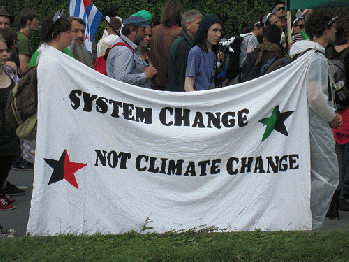Reprinted from popularresistance.org
President Donald Trump's decision to withdraw from the Paris climate agreement follows the path of previous presidents who have undermined international climate agreements. We disagree with Trump but it is important to understand his actions in the context of the history of the United States regarding previous climate agreements. Once again, the political problems in the US are bigger than Trump. His action brings greater clarity to the inability of the US government to confront the climate crisis and clarifies the tasks of people seeking smart climate policy.
The US Has Always Prevented Effective International Climate Agreements
The US has consistently blocked effective climate agreements because both parties in power have put the profits of big energy before the climate crisis when it comes to domestic and international policies. The Republicans proclaimed themselves the "drill baby drill" party while the Democrats are the "all of the above energy" party. Both slogans mean the parties seek to ensure US corporations profit from carbon energy. Both have supported massive oil and gas infrastructure and extreme energy excavation including the most dangerous forms, i.e. tar sands and fracking. Both parties have also supported wars for oil and gas. All of these positions will be viewed as extreme as the world confronts the great dangers of the climate crisis and the US will be deservedly blamed.
If we go back to the Clinton-Gore administration and the Kyoto Protocol we find the US pushing a "free market" trade in pollution credits, where corporations would buy the right to pollute in other places around the world, i.e. poor and developing countries. Gore made sure other countries understood the US' position. As Mitchel Cohen writes:
Gore commandeered the Kyoto conference. The U.S. government, he said, would not sign the Accord -- as limited as it was -- if it imposed emissions reductions on industrial countries. Instead, he demanded that the rest of the world adopt his proposal that would allow industrial nations like the U.S. to continue polluting by establishing an international trade in carbon pollution credits. Gore's "solution" -- like Obama's -- was to turn pollution into a commodity and buy and sell it in the form of "pollution rights". The free market trade in "pollution credits" would simply shift around pollution and spread it out more evenly without reducing the total amount of ozone-depleting greenhouse gases. It would allow the United States and other industrial countries to continue polluting the rest of the world.
The Kyoto Protocol failed. Rather than reducing climate gas emissions by the 5 percent target, there was a significant increase of 58 percent from 1990 to 2012.
In Copenhagen, the story is more complex but has the same result -- the US undermined efforts for an agreement with enforceable reductions in climate emissions. The US role in Copenhagen become more fully understood when Edward Snowden leaked documents showing intense US spying on other nations participating in the climate talks. The most important spying was on the Danish government where the US leaked a draft of a plan for enforceable emissions standards; and on China where the US intruded into a meeting where the Chinese, Indians and others were working on a similar plan.Chinese negotiators entered into the talks willing to undertake mandatory emissions cuts but instead the US falsely turned China into the villain. The editor of the Ecologist, Oliver Tickell, summarized what happened:
Looking at the evidence as a whole there can be little doubt that the Copenhagen climate talks were deliberately and highly effectively scuppered by a 'dirty tricks' operation carried out by the NSA and other US security agencies -- including the pivotal leak to The Guardian of the Danish text.
Following Snowden's revelations, we know that they had the ability to do that in spades. They also had motives. The US wanted:
* to protect their politically powerful fossil fuel industries, and their right as a nation to carry on polluting;
* to avoid having to pay out billions of dollars in climate funding to developing countries;
* to deny China the global leadership role it sought to secure for itself, and instead leave it humiliated;
* to present the USA and its President Barack Obama as trying against the odds to secure a climate agreement, in the face of obdurate resistance by other countries.
The operation was, in other words, spectacularly successful. The rest of the world were played for suckers. China emerged with a bloody nose. And the US was free to carry on letting rip with its emissions.
(Note: You can view every article as one long page if you sign up as an Advocate Member, or higher).





